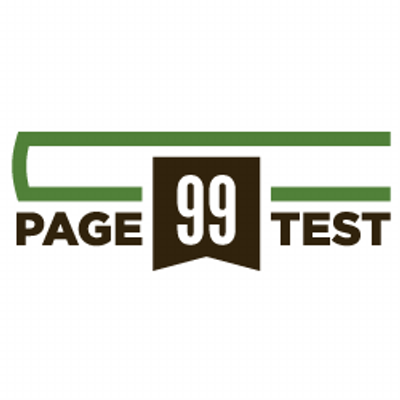Can you judge a book by Page 99?
The 19th century novelist Ford Madox Ford, beloved of literary types for his perfect gem of a novel The Good Soldier, has lately seen his name appear more widely, attached to this quote:
“Open a book to page ninety-nine and read, and the quality of the whole will be revealed to you.”
Ford never explained why he picked that particular page at the litmus, but his “Page 99 Test” is quickly becoming better known than Ford himself — thanks partly to an American playwright and screenwriter named Marshal Zeringue, who founded a blog devoted to the idea. Since starting it in 2007, Marshal has run more than a thousand of these mini-reviews, which together serve as both an informal test of Ford’s theory and welcome press for the authors of deserving books that are underexposed because they don’t, you know, involve vampires.
My own stab at the Page 99 Test can be found here.
The Page 99 Test is an idea for our age. Everybody’s falling-down-busy and desperate for cheats and life hacks that will let them do stuff and learn stuff in a fraction of the time, in the cracks and margins. The only thing that scares us more than vampires is wasting time. Having a sneaky way to assess in 90 seconds whether a book is worth the effort? Priceless.
Unless there’s some sort of Masonic significance to the double-9s, it’s probably an arbitrary number. But it makes sense to pick a page around there, in the early middle. For sure it’s better than judging a book by page 1. Every author spends inordinate time shining up those first few paragraphs to lure you in, and often as not there follows a dropoff in quality. (Because, hey, you’ve already bought the book!) By page 99, the scene is set, the characters are established, the narrative engine is starting to rev. The story is going somewhere — or not. Philip Larkin once famously claimed that British novels are generally made up of “a beginning, a muddle, and an end.” Most books are. Middles are hard; sustaining momentum is a feat of magic.
Something else page 99 has going for it? It’s a perfect place for the author to step back and reveal the whole landscape. Sometimes you will find the whole book in microcosm on page 99 or thereabouts. Sometimes there exactly. In Amy Tan’s The Joy Luck Club, page 99 “takes place at exactly the moment Waverly has started winning chess championships and the community is rallying around her,” one critic found. In Chuck Palahniuk’s Fight Club, page 99 is the moment the hero’s dual identity is revealed. I flipped to page 99 of Fifty Shades of Gray the other day while waiting in the grocery line. (I didn’t pull my own dog-eared copy from under the mattress, honest.) It was a bit shocking. That page so perfectly aces the Page 99 test that you almost suspect the author knew that browsers would be kicking the tires there, and so built the page to contain the nut of the story, plus a tantalizing hint of what’s to come. Even the writing wasn’t terrible. I almost jettisoned my avocados to buy the book. At the very least, it made me think of other uses for avocados.
Marshal runs his Page 99 Test blog out of a mothership called the Campaign for the American Reader, “an independent initiative to encourage more people to read more books.” Marshal himself is a bit of a man of mystery. He appears to be among those rare folk who are genuinely here to help. He has created this great vehicle for other writers to advertise themselves, but he is himself “internet-shy.” This of course makes you want to know more about him. He trained to be a political scientist (at Tulane and UVA) but stopped just short of getting his Ph.D. to pursue the creative-writing dodge. You can see the depth/breadth of his tastes in his book selection. There are a lot of smart and worthwhile titles here you’ve never heard of – just as you’ve never heard of Marshal.
“I suppose getting out front and pimping my blog would be good PR,” he said in an email, “but I feel like the work I do on the site already sucks up too much of my reading, writing & movie-viewing time, and have resisted (the relatively few) invitations to promote my sites.”
The other site of Marshal’s worth noting – and I won’t note it at length cause I plan to do another whole blog post on it – is called My Book, The Movie.
I think of Marshal as a kind of literary superhero, moving incognito among us. Maybe someone should write a book, or make a movie, about him.
